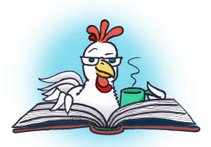As an Anglophile from way back, who cut my literary teeth on E. Nesbit's books about the Bastable Children, intrigued by their fascinating and mysterious world (Why did they have a pudding every day? And what was a pantomime? And who on earth was this mysterious "general" who seemed to be a housekeeper?) I was disgusted to discover, as an adult, that the U.S. editions of Helen Oxenbury's charming board books had obviously been bowdlerized and that the line that had surely been "Wave to Mum" in the original (because it rhymed with last word of the previous page--"thumb," or "plum," or something) had been stupidly changed to "Wave to Mom." I just used to read it "Mum" anyway. Same with U.S. versions of Shirley Hughes's "Alfie" books (also almost all out of print! Phooey Phooey Rats!).
Much has been written about the Americanization the Harry Potter books' U.S. editions (see this line-by-line analysis of the first book for details) but one of the happy side-effects of the Potter phenomenon is that publishers seem to be finally realizing that American kids are not stupid and can deal just fine with some exotic and unfamiliar words, and in the last several years there's been a flood of British kid- and YA-lit imports, generally quite lightly edited.
Some of my favorites (or favourites, I guess I should say) of these are Hillary McKay's books about the artistic and eccentric and troubled and hysterically funny Casson family. When the third title, Permanent Rose, came out a couple of years ago I couldn't wait for the US. publication and bought the British (well, Canadian) edition on a trip to Vancouver. Truth is, I bought the British edition because I just like British editions of British books better: you can be sure that you're reading the real deal, with all the hair elastics and lorries and car boots and single quote marks left intact.
The U.S. version I ordered for the library hadn't come in yet by September, so I loaned my copy to a kid who had loved the first two books, Saffy's Angel and Indigo's Star, and couldn't wait to read the new one.
She brought it back a couple weeks later. "It was good," she said, "but kind of confusing. Like, what's a biro?"
I thought back to the opening scene, in which Rose, the youngest and fiercest of the Casson siblings, opens the door to a friend of her brother's, who is nonplussed to see that she's been writing all over herself with the aforementioned article. "It's a ballpoint pen."
"Ohhhhhh." She nodded, satisfied at last. "Okay, that makes sense."
So, it's true, you can't necessarily catch everything from context. And I did notice that in the American edition that arrived a few weeks later the word had indeed been translated to "ballpoint pen."
This is all by way of a lengthy and meandering introduction to a link that might be of interest to other Anglophiles, literary or otherwise: Separated by a Common Language is all about the differences between British and American English. I found myself unable to stop reading the post and comments linming the differences between a "hair slide," "hairband" and "barrette." Check out the highly illuminating post on Types of Schools and School Years, too.
Found via Books, Words, and Writing.
Subscribe to:
Post Comments (Atom)

1 comment:
Excellent - I finally found out what a kirby grip is! (a bobby pin) It's in one of my favorite books, Brat Farrar, and I always pictured a large, metal barrette.
Post a Comment